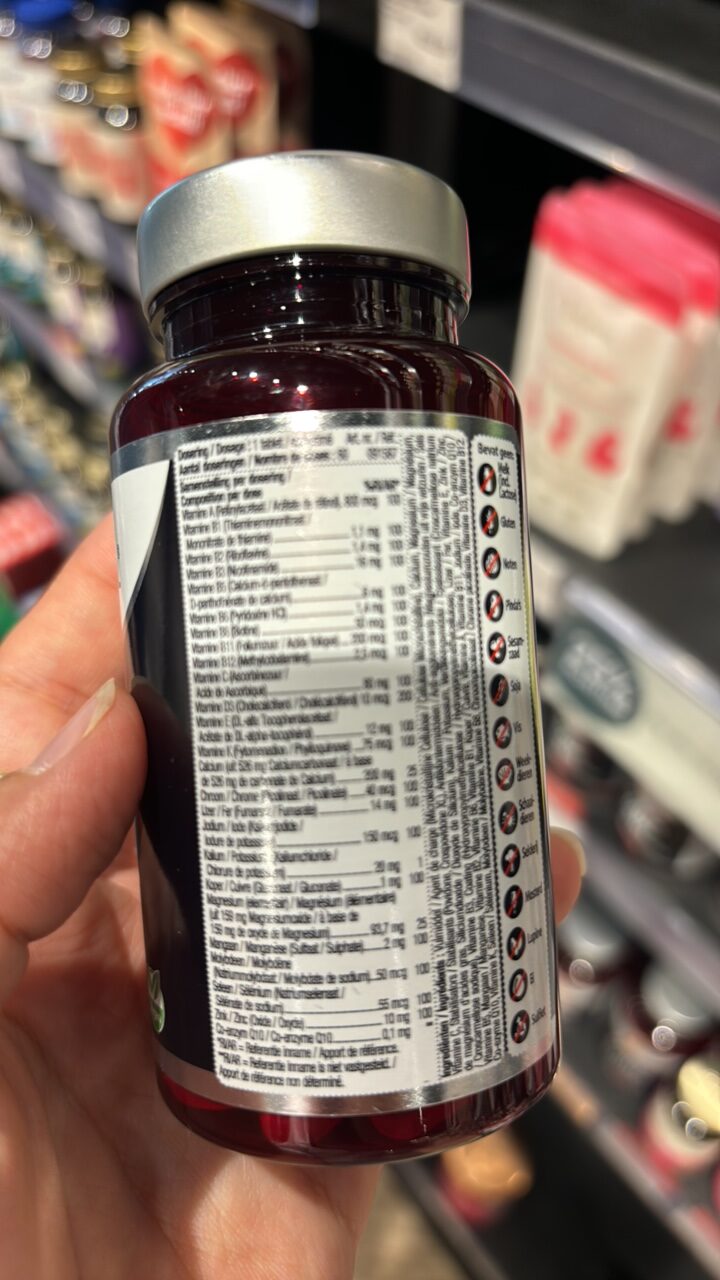
Barcode: 8713713091587
None
HALAL
📝 Reason: Most minerals and vitamins are Halal when synthetically sourced. Two ingredients (‘pyridine’, ‘mononitrate de frenine’) as well as ‘wanne pecorinonar’ are doubtful due to ambiguous or unknown origins, so the product status should be considered Doubtful per Islamic law (Quran 5:3). All other components are confirmed Halal as per public Halal references (IFANCA, Islamic authorities).
📄 Certificates: Vegetarisch, Vegan
Ingredients:
Details
Is None Halal? Unveiling Its Ingredients and Their Statuses
When it comes to ensuring that our dietary choices meet Halal standards, it is crucial to delve into the ingredients that make up the products we consume. In this post, we will explore the Halal status of None and examine each component based on the available data. According to Islamic dietary laws, the term ‘Halal’ refers to what is permissible or lawful. Our focus here is to analyze the ingredients of None and understand their Halal compliance.
Overview of Halal Status
The product None has been classified as HALAL. However, it is important to note that there are certain ingredients associated with it that have raised queries about their origins. As per the short explanation provided, most minerals and vitamins are considered Halal when sourced synthetically. However, there are three ingredients—mononitrate de frenine, pyridine, and wanne pecorinonar—that are questionable due to their ambiguous origins. Therefore, while the overall product is classified as Halal, the uncertain status of these specific components warrants further exploration.
Ingredient Breakdown
Below, we will examine each ingredient within the product None to clarify its status:
- Mononitrate de Frenine: Status – Doubtful. This ingredient is not widely recognized, suggesting it might be a misspelling or a rare compound. As its source is ambiguous, it cannot be confirmed as Halal or Haram. [Source](https://www.halalharam.org/)
- Vitamin B: Status – Halal. This is a generic term for B vitamins such as B1, B2, B6, and B12, which are typically synthetic or plant-based, making them Halal unless the carrier is non-Halal. [Source](https://www.ifanca.org/halalsite/halal-vitamins/)
- Pyridine: Status – Doubtful. Pyridine is an organic compound often used as a solvent. Its source is unclear and could potentially be synthetic or from animal sources. [Source](https://www.ncbi.nlm.nih.gov/pmc/articles/PMC5929987/)
- Wanne Pecorinonar: Status – Doubtful. This is not a recognized food ingredient; its origin remains unclear, leading to questions about its Halal status. [Source](https://www.isithalal.com)
- Vitamin E (Tocopherol): Status – Halal. Vitamin E is generally derived from plant oils or synthesized, and is widely accepted as Halal. [Source](https://www.halalfoodshop.co.uk/is-vitamin-e-halal/)
- Fer Fumarate: Status – Halal. This is a synthetic iron supplement, considered Halal in composition. [Source](https://www.food-info.net/uk/e/e297.htm)
- Fumarate: Status – Halal. Derived from fumaric acid, this ingredient is also synthetically produced and Halal. [Source](https://www.foodingredientfacts.org/ingredients/fumaric-acid/)
- Magnesium Oxide: Status – Halal. A mineral salt, magnesium oxide is synthesized and Halal. [Source](https://www.halalconsumer.com/halal-certification/mineral-supplements/)
- Magnesium: Status – Halal. This mineral is naturally occurring and Halal. [Source](https://www.isithalal.com/content/mineral-ingredients)
- Manganese: Status – Halal. A naturally-occurring mineral also classified as Halal. [Source](https://www.isithalal.com/content/mineral-ingredients)
- Molybdenum: Status – Halal. This trace mineral is recognized as Halal. [Source](https://www.isithalal.com/content/mineral-ingredients)
- Sodium: Status – Halal. A naturally-occurring mineral, Sodium is also Halal. [Source](https://www.isithalal.com/content/mineral-ingredients)
- Selenium: Status – Halal. This mineral is considered Halal. [Source](https://www.ifanca.org/halalsite/halal-minerals/)
- Co-enzyme Q10: Status – Halal. Typically sourced synthetically or through microbe fermentation, this ingredient is assumed to be Halal unless specified otherwise. [Source](https://www.halalchoices.com.au/)
- Croscarmellose Sodium: Status – Halal. A disintegrant derived from cellulose, this ingredient is confirmed Halal. [Source](https://en.m.wikipedia.org/wiki/Croscarmellose_sodium)
- Zinc: Status – Halal. Zinc is a naturally-occurring mineral and is Halal in supplement form. [Source](https://www.ifanca.org/halalsite/halal-minerals/)
- Silicon Dioxide: Status – Halal. Often used as an anti-caking agent, it is mineral-based and Halal. [Source](https://www.foodinsight.org/ingredient/silicon-dioxide/)
- Kalium (Potassium): Status – Halal. Kalium is the European term for Potassium, which is a mineral and Halal. [Source](https://www.ifanca.org/halalsite/halal-minerals/)
Conclusion
In conclusion, while None is primarily classified as Halal, the ambiguity surrounding specific components like mononitrate de frenine, pyridine, and wanne pecorinonar places them in a not-determined category regarding Halal status. The rest of the ingredients, particularly the numerous vitamins and minerals, are sourced sustainably and are acknowledged as Halal. Therefore, it is vital for consumers to consider their individual standards and beliefs when evaluating product ingredients.
